Government Implements Measures to Regulate Spaza Shops and Combat Foodborne Illnesses
To read the full presentation, click here
The Portfolio Committee on Cooperative Governance and Traditional Affairs has been presented with a comprehensive progress report detailing the registration of spaza shops and food-handling outlets, alongside interventions aimed at curbing foodborne illnesses. The report, aligned with the District Development Model, highlights key regulatory steps and public health initiatives taken to address these concerns.
According to the report, 87,407 registration applications were received between July 2024 and February 2025, with 23,072 approvals granted. Of these, 2,977 applications were from foreign nationals, representing 13% of approvals. Challenges identified include delays in verifying foreign-owned businesses, lengthy certification processes, and a limited adoption of digital registration systems.
To tackle food safety risks, the government classified foodborne illnesses as a national disaster in November 2024, leading to the establishment of an Integrated Multi-Disciplinary Task Team (IMDTT). Key measures include stricter regulation of hazardous substances, improved enforcement of food safety laws, and targeted clean-up campaigns in affected areas.
A R500 million Spaza Shop Support Fund has been introduced to assist township businesses, with allocations for refurbishments, regulatory compliance, and capacity-building initiatives. Additionally, the Department of Small Business Development (DSBD) has launched “DSBD Connect,” a platform aimed at providing business verification services and funding access.
Further enforcement actions include the closure of non-compliant shops, the deployment of environmental health practitioners, and the strengthening of regulations surrounding food handling and pesticide use. Municipalities are also mandated to enforce bylaws and ensure proper monitoring of food safety standards.
The report underscores a coordinated effort between multiple government departments, law enforcement agencies, and municipalities to enhance food safety, support small businesses, and safeguard public health.





